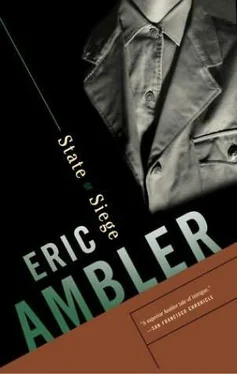Eric Ambler - State of Siege
Здесь есть возможность читать онлайн «Eric Ambler - State of Siege» весь текст электронной книги совершенно бесплатно (целиком полную версию без сокращений). В некоторых случаях можно слушать аудио, скачать через торрент в формате fb2 и присутствует краткое содержание. Год выпуска: 1956, ISBN: 1956, Издательство: Berkley, Жанр: Криминальный детектив, на английском языке. Описание произведения, (предисловие) а так же отзывы посетителей доступны на портале библиотеки ЛибКат.
- Название:State of Siege
- Автор:
- Издательство:Berkley
- Жанр:
- Год:1956
- ISBN:9780425067680
- Рейтинг книги:3 / 5. Голосов: 1
-
Избранное:Добавить в избранное
- Отзывы:
-
Ваша оценка:
- 60
- 1
- 2
- 3
- 4
- 5
State of Siege: краткое содержание, описание и аннотация
Предлагаем к чтению аннотацию, описание, краткое содержание или предисловие (зависит от того, что написал сам автор книги «State of Siege»). Если вы не нашли необходимую информацию о книге — напишите в комментариях, мы постараемся отыскать её.
State of Siege — читать онлайн бесплатно полную книгу (весь текст) целиком
Ниже представлен текст книги, разбитый по страницам. Система сохранения места последней прочитанной страницы, позволяет с удобством читать онлайн бесплатно книгу «State of Siege», без необходимости каждый раз заново искать на чём Вы остановились. Поставьте закладку, и сможете в любой момент перейти на страницу, на которой закончили чтение.
Интервал:
Закладка:
There was something moving against the fingers of my right hand and I half opened my eyes. Rosalie was gently removing the glass that I had been holding. Her hair was down over her shoulders, the sarong was fastened at her waist and she had a narrow scarf draped loosely over her breasts like a country woman. She looked beautiful. I remained still and watched while she placed the glass gently on the bedside table. Then, she glanced at me and saw that I was not asleep. She smiled and sat down on the edge of the bed. I took her hand.
“There’s something I’d better tell you,” I said.
“I know, but you are very tired. Sleep first.”
“Sanusi said that by this time tomorrow he would have moved his headquarters, and that we would be free.”
“And does he not mean it?”
“Oh yes, he means it, but there are things he doesn’t know.”
“Tell me.”
“He’s in a trap. It was all a trap; the garrison leaving the city unprotected; promises from men he thought he could trust that they would bring over their troops to his side; assurances that the country was waiting for his leadership, appeals to his vanity, warnings that if he hesitated he would be lost; anything to trick him into coming down from the hills with all his men so that the Government tanks and guns could move in and cut him to pieces. Well, it’s worked. Tomorrow he thinks that he’ll be moving over into the Presidential Palace. He won’t. He’ll be fighting for his life, here, and I don’t imagine that he has any chance at all of winning.”
She had been looking down at my hand. Now, her eyes looked into mine. “How do you know this? Who told you?”
“You may be better off if you don’t know.”
“Major Suparto.” It was a statement, not a question. I said nothing.
“They might still get away to the hills.”
“Not very many of them. And none from this building, I think. They know where Sanusi is, all right.”
“It will be bad again for us here.”
“I’m afraid it will.”
She took my hand and, leaning forward over me, held it against her breast so that my fingers touched one of the nipples. I felt it harden, and she smiled.
“You see,” she said, “I am not afraid.”
She pressed my hand, and then moved away. “You must sleep now, and I think I will sleep, too.”
She lay down on her bed and stared up at the ceiling. I watched her face for a while, and then my eyes closed. After a moment or two, I heard her say my name.
“Yes, Rosalie?”
“Perhaps we should wear our clean clothes tomorrow.”
7
The attack on the city began just before dawn.
I thought at first that it was the voices of the men in the living room that had awakened me. Some sort of argument was going on, and another man was speaking on the telephone. He kept repeating the word “impossible.” The argument seemed to be about someone named Dahman who had moved his troops without authority.
Then, I became aware of an irregular thudding that sounded as if, somewhere in the building below us, the wind was slamming a heavy padded door. Only there was no wind.
I opened my eyes and saw Rosalie standing by the window. There were lights flaring in the sky behind her. I sat up and gasped as I realised how sore my body was. She looked round. I got off the bed carefully and went over to the window.
Rosalie was looking over towards the bay. As I joined her, two cones of orange flame stabbed the darkness there. The sound took about three seconds to reach me, and, as it thudded against the windows, there were two more flashes. This time I caught a momentary glimpse of the shape behind them, and knew why the forts commanding the sea approaches to Selampang had not surrendered to Sanusi. The Sundanese navy consisted of only five ships: one lighthouse tender, three small patrol vessels and the flagship, an elderly destroyer which the Government had bought from the British and re-named Semangat . I had seen her in Port Kail. She had four 4.7-inch guns.
She was firing into an area to the left of the racecourse, and you could see the flashes of the bursts reflected on the smoke drifting away from earlier ones. Rosalie said that the barracks were in that direction.
“What should we do?” she added.
“There’s nothing we can do.”
She came back with me and we lay together on my bed, listening. Two men from the next room had gone out on the terrace now and were discussing the situation in low tones.
“What will happen?” Rosalie asked.
“I don’t know enough about it. I suppose these people have established some sort of defence line on the outskirts. If so, the other side, with their tanks and guns, will find the weakest spot and blast their way through. This naval bombardment is just the preliminary softening up. I suppose it’s meant to impress the civil population, too. But it’s the tanks and guns that will decide the thing. Unless Sanusi has tanks and guns to fight back with, there’s nothing he can do to stop them. I’m certain he has no tanks.”
“Has he guns?”
“There are a couple of anti-tank guns down in the square. I suppose he has a few more dotted about the city. I don’t know how old the Government tanks are, but unless they are very old indeed, the shot that those guns fire won’t even knock a dent in them. They might stop a light armoured car, but nothing heavier.”
“What will happen, then?”
“That depends on how hard these people fight.”
“But you said they cannot win.”
“I don’t think they can. It’s only a question of how long it takes to defeat them.”
She was silent for a moment, then she said: “To kill them all, you mean?”
“Most of them, anyway.”
“They might surrender.”
“They might, yes. Let’s hope they will.”
“Yes, let us hope.” She must have guessed from my tone that I did not think that there was much likelihood of it. The Government were certainly not going to let Sanusi get out of the trap once he was in it, and Sanusi would not be such a fool as to believe in any promises they might make. Besides, when street-fighting began and men began to kill at close range, it became difficult to surrender.
I was remembering a Fusilier sergeant I had met in Burma. It was some weeks before we went into Mandalay. My company had been clearing a forward airstrip and were waiting to be flown out to another job. This sergeant had come out from the Eighth Army in Italy, and because we had both been in the desert with Auchinleck, we had started talking. He had had experience of street-fighting against the Germans, and had later become an instructor on the subject. He had developed a passion for it that even he, I think, suspected to be a trifle unhealthy. All the same, he could not wait to get into Meiktila and try his skill on the Japanese.
“It’s an art, sir, rushing a building,” he had told me eagerly; “a bleeding art. They can’t stop you if you know how. You just have to get near enough first. That’s the dodgy bit. There’s usually plenty of cover, though, shell holes, ruins and that, but you’ve got to have patience. Crawl, dig your way there if you have to, but don’t start until you’re within thirty yards of a window. Then go mad. Put a four-second grenade in first and follow it. By the time you’re there they’ll be wetting themselves, if they’ve got anything left to wet with. Then, you go through the whole house. Quick as lightning. Every room. First a grenade, and then yourself. Doesn’t matter what’s there. Doesn’t matter who’s there. Then, comb it out with your machine pistol. If it’s a soft house, put a burst up through the ceiling and catch them bending. But don’t stop for a second. Be as quick as lightning. First a grenade, and then yourself with the old machine pistol, trigger happy. Don’t be afraid of anything. They’re more frightened of you than you are of them because you’re attacking. Blind ’em and then hit ’em with everything. And when you run out of ammo, still keep going while they’re dazed. Knife, shovel, the lot! Keep going and there’s nothing that can stop you, sir. I’ve seen it. I’ve done it. I know.”
Читать дальшеИнтервал:
Закладка:
Похожие книги на «State of Siege»
Представляем Вашему вниманию похожие книги на «State of Siege» списком для выбора. Мы отобрали схожую по названию и смыслу литературу в надежде предоставить читателям больше вариантов отыскать новые, интересные, ещё непрочитанные произведения.
Обсуждение, отзывы о книге «State of Siege» и просто собственные мнения читателей. Оставьте ваши комментарии, напишите, что Вы думаете о произведении, его смысле или главных героях. Укажите что конкретно понравилось, а что нет, и почему Вы так считаете.












